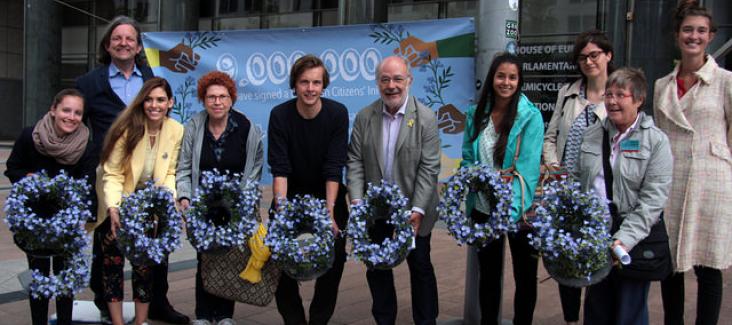In an open letter more than 70 civil society organizations have called upon the European Parliament to strengthen its follow-up of successful European Citizens’ Initiatives. The letter was launched by Democracy International, ECI Campaign and WeMove.EU and calls on the EP to upgrade its ECI policy and hold a debate and vote in plenary on every single successful ECI before the Commission adopts its formal response.
During the public action this Monday outside the EP, hard copies of the open letter, tied with forget-me-not flowers, were handed to MEPs. The activists called on them to make the ECI, the world’s first and only transnational tool of direct democracy, more efficient . According to the open letter, which refers to the more than nine million EU citizens who have signed an ECI in the last six years, the current procedure dealing with initiatives which reach the goal of at least one million signatures from at least seven member states, is far too intransparent – and does little to reward active citizens.
ECI organisers and supporters today have no way of knowing how a European Commission reply has come into being and whether this can be considered a democratically fair response. Only a debate and vote in plenary by the European Parliament on all successful ECIs, before the Commission adopts its formal response, can assure the signatories that their demand is being fairly and democratically considered.
“Six years after its launch it is time to upgrade the ECI process by allowing the European Parliament a bigger role”, says Bruno Kaufmann, board member of Democracy International and one of the early proponents of the ECI-tool in the early 1990s. “While being a direct tool of communication between the EU citizens and the EU Commission, the European Parliament needs to support consistent public deliberation on a regular basis”.
The European Parliament Friendship Group on Citizens’ Rights hosted a discussion so as to examine proposals for the reform of the ECI. Guest speakers were Maarten de Groot (ECI Campaign), one of the initiators of the Open Letter and Mr Gyorgy Schöpflin, the EP’s ECI Rapporteur. Schöpflin suggested that the wording of the legal basis for the ECI in the Lisbon Treaty is one of the reasons for the weak follow-up that is being given to successful ECIs.
“The way it is laid out in Article 11 the ECI is an invitation, and ‘inviting’ means ‘inviting’,” Rapporteur Schöpflin said, “Even if an ECI has 100 million signatures, the Commission can say ‘Thank you very much. This is very kind of you, but we decide’.” “One needs a much stronger vision in the next treaty for what the ECI can and cannot achieve. This new regulation is an improvement, it should function more smoothly, but it won’t solve the problem of ‘invite’.”
Background
Democracy International has been campaigning for a strong European Citizens’ Initiative since 2003. The ECI came into existence with the Lisbon Treaty and became legally effective in April 2012 with the EU regulation 211/2011. It quickly became clear that it suffered from shortcomings, which were acknowledged by the European Commission itself in a report released in March 2015. In October 2015, the EP voted in favour of a reform of the ECI regulation. EU First Vice President Frans Timmermans announced at ECI Day 2017 that the Commission will begin a revision process of the ECI regulation. Since then, the Commission has made a proposal to revise the ECI, and the AFCO of the EP drafted a report detailing their view for the revision. A vote about the adoption of this report will take place on 20 June. At this time, it is paramount that MEPs bear in mind civil society demands.
Links and materials
Read the full joint open letter.
Pictures of the action can be found here and are free to use.
To learn more about the ECI.
For any questions/further information, please contact:
- Daniela Vancic: vancic@democracy-international.org, +49/ 2203 180 2881 or
- Maarten de Groot: maarten@citizens-initiative.eu, +31/ 6 40 59 56 47

